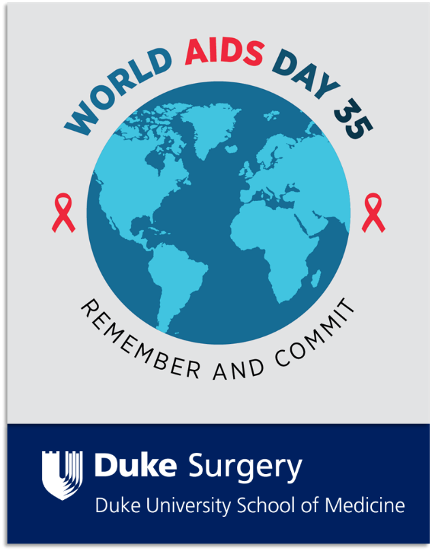
The HIV Organ Policy Equity Act (HOPE Act) stands out as a crucial milestone in the field of organ transplantation.
The HOPE Act, enacted in 2013 and implemented in 2015, was created to streamline safeguards and research guidelines related to transplantation of organs from HIV-positive organ donors to HIV-positive individuals. Underscoring the value of the HOPE Act, more than 350 organs have been transplanted between HIV-positive donors and patients since its implementation.
As of November 2022, 31 transplant hospitals were enrolled with the Organ Procurement and Transplantation Network to participate in HOPE Act research. Duke remains one of six centers with a living donor program, and one of only three centers in the United States that have participated in a living HIV to HIV exchange donation.
This not only underscores Duke's commitment to medical innovation but also positions it as a trailblazer in expanding transplantation possibilities for individuals affected by HIV. For patients living with HIV, the HOPE Act has facilitated shorter wait times for organs to those in need. This act has also provided the opportunity for people with HIV in the community to sign up to become organ donors, which was previously out of reach.
The HOPE Act has also provided an opportunity for HIV researchers to partner with people living with HIV infection to initiate novel lines of research that would not be possible without this transformative framework. The Department of Surgery's Division of Surgical Sciences, along with Duke Center of AIDS Research (CFAR) investigators and the UNC CFAR team is leading the way in utilizing the HOPE Act to enable cutting-edge research needed to develop innovative strategies for understanding HIV latency, a critical barrier to eliminating HIV infection.
The Duke team’s diverse research portfolio encompasses projects led by seasoned investigators with extensive experience, as well as those spearheaded by early-stage investigators and trainees. Research on HIV, led by Guido Ferrari, MD, Professor in Surgery and Duke CFAR Immunology Core Director, and Justin Pollara, PhD, Associate Professor in Surgery and Associate Director of the Duke CFAR Developmental Core, serves as a prime illustration of collaborative efforts across teams and works as part of the CARE program led by David Margolis, MD, Director of UNC HIV Cure Center and Associate Director UNC CFAR.
This initiative not only contributes to advancing studies related to the HOPE Act, it also involves mentoring a diverse group of early-stage investigators, including Medical Instructor Marina Tuyishime, PhD, Medical Instructor in the Department of Surgery, and Medical Scientist Training Program (MD/PhD) student Danielle Nettere. Together, under the umbrella of the HOPE Act, this team in collaboration with Infectious Disease expert, Cameron Wolfe, MBBS, Professor of Medicine, has created a novel pipeline to collect and utilize lymphatic tissue from persons with HIV undergoing solid-organ transplant.
These efforts can now help the team learn how these cells respond to a class of anti-HIV drugs called latency reversing drugs that unmask the presence of virus-harboring cells with the goal of eliminating them. This significant research was recently showcased at various institutional and national conferences in 2023, notably at the Duke CFAR Annual Retreat on September 14, 2023, and the NIH Cure meeting on October 12, 2023—held at the NIH Campus. Furthermore, in collaboration with Maria Blasi, PhD, Associate Professor in Medicine, the teams are evaluating novel strategies to identify cells harboring hidden virus, especially in the kidney, and study viral biology in people living with HIV.
By engaging in a comprehensive and cross-disciplinary research approach, Duke is actively contributing to the evolution of organ transplantation under the HOPE Act, striving to bridge gaps, mitigate risks, and ultimately increase the pool of organs available for transplant. Furthermore, basic science investigations afforded by the HOPE Act can also lead to development of novel models of research, which will help us to better understand the links between HIV biology and organ transplantation and advance the development of novel therapeutic strategies designed to end the HIV epidemic.
A full list of researchers in the Department of Surgery supported with active HIV/AIDS grants:
Aravind Asokan, Ph.D., Chin-Ho Chen, Ph.D., Cordelia Manickam, Ph.D., David Montefiori, Ph.D. , Daniel Schuster, MD, MS, , Georgia Tomaras, Ph.D., Guido Ferrari, MD, Haleigh Conley, Ph.D., Justin Pollara, Ph.D., Kent Weinhold, Ph.D, Kevin Saunders, Ph.D., Li Huang, Ph.D., Marcella Sarzotti-Kelsoe, Ph.D, Marina Tuyishime, Ph.D., Moses Sekaran, Ph.D., Priyamvada Acharya, Ph.D., R. Keith Reeves, Ph.D, Stephanie Jost, Ph.D., Xiaoying (Shaunna) Shen, Ph.D and Wilton Williams, Ph.D.
Faculty and staff within the Division of Surgical Sciences and the Department of Medicine produced this article, with some information provided by ChatGPT and subsequently edited thereafter.